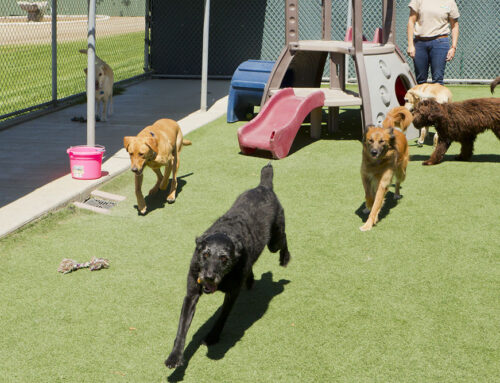As your beloved pet begins to slow down, and show a little grey around her muzzle, you may notice different behaviors and personality changes. Cognitive dysfunction is a common problem of senior pets, affecting up to two-thirds of dogs in their golden years, but it is not a normal part of aging, and affected pets require special care and consideration.
What is cognitive dysfunction in pets?
Cognitive dysfunction, or dementia, is a neurobehavioral disorder that alters the processes a pet uses to gather information about their surroundings, through perception, awareness, learning, and memory, and determine how to react. More research has been performed about cognitive impairment in dogs than cats, and several degenerative changes have been observed in the brains of dogs affected by cognitive dysfunction, including:
- Brain shrinkage — Cerebral cortex atrophy occurs as a result of normal aging, but seems to be more severe in dogs with dementia.
- Protein deposits — Protein plaques have been observed in the brains of affected dogs, and treatments geared toward reducing plaque formation have proven successful, indicating they may play an important role in the disease process.
- Oxidative damage — Increased free radicals in the brain may cause oxidative damage, which is known to cause cognitive decline in people and animals.
Canine cognitive dysfunction is often compared with human Alzheimer’s disease, since the behaviors and nervous system changes associated with the two conditions are similar. Although how much these changes contribute to cognitive decline in dogs and cats is unknown, research is ongoing.
What are cognitive dysfunction signs in pets?
Behavior changes associated with canine cognitive dysfunction have been well-studied, and are described using the acronym DISHAA:
- Disorientation — Affected dogs often become disoriented in their normal environment. Your dog may get stuck behind an open door or a couch, wander into areas of your home she typically avoids, or become lost in her own backyard. Your dog may not respond when you call or speak to her, and may lose sense of time, no longer alerting you when it’s time for breakfast, or her daily walk.
- Interactions — Your dog’s interactions with you, or other family members and pets, may change. Your previously social dog may no longer seem interested in playing or cuddling, and may stop greeting you when you arrive home. Your pet may become withdrawn or downright grumpy or, alternatively, she may become clingy and anxious.
- Sleep-wake cycles — Dogs with dementia often sleep more during the day, only to restlessly pace the floors at night. Anxious dogs may also bark or howl, keeping their owners awake.
- House soiling — Dogs with cognitive dysfunction often lose the ability to understand that eliminating in your home is unacceptable. Incontinence is also common, and your perfectly housetrained dog may no longer be able to hold urine or feces for more than a few hours.
- Activity level changes — Your dog may stop responding to things that normally grabbed her attention, such as backyard squirrels, or visitors. She may no longer seem interested in sniffing out new smells on her daily walk, and may also stop grooming. Many pets experience appetite changes, and she may eat less.
- Anxiety level changes — Anxiety is a hallmark of canine cognitive dysfunction, and your dog may easily become agitated or restless. Pacing and wandering are common, and once-secure pets may become distressed when left alone.
Although the DISHAA acronym describes canine behaviors, cats with cognitive dysfunction display similar changes, and commonly wander and vocalize loudly at night, urinate and defecate outside the litterbox, stare into space or at walls for long periods, and become disoriented in familiar surroundings.
How is cognitive dysfunction diagnosed in pets?
Since cognitive dysfunction is a behavior disorder, no specific test can be used to make a diagnosis. Instead, our Animal Clinic of Council Bluffs team will gather information about your pet’s behaviors, and determine if a diagnosis of cognitive dysfunction fits. As part of the diagnostic process, we may need to rule out other medical conditions that could be causing your pet’s behaviors. For example, arthritis pain may prevent your dog from rising to greet you, or a urinary tract infection may lead to house soiling. Your older pet may suffer from vision or hearing loss, which could explain her disorientation, or lack of response to your voice.
How can I help my pet with cognitive dysfunction?
If we diagnose your pet with cognitive dysfunction, we will work with you to formulate a multi-modal treatment plan that may include:
- Cognitive enrichment — Activities designed to mentally stimulate your dog, such as solving food puzzles, playing with new toys, and learning new tricks, can help keep her mind sharp. Remember that any environmental change can be stressful to a pet with cognitive dysfunction, so add new activities slowly, to prevent anxiety-related rejection.
- Environmental modifications — You can use calming pheromones, available as a plug-in diffuser, spray, or impregnated collar, to help ease your pet’s anxiety. A white noise machine may help calm pets who are anxious at night, about strange noises they are not used to hearing.
- Supplements — Supplements, such as omega-3 fatty acids, medium-chain triglycerides (MCTs), L-carnitine, and vitamins A, C, and E, support brain health, and may improve cognitive function in pets with dementia. Pet foods and vitamin supplements containing combinations of these supplements are available; however, speak with your veterinarian before starting any supplement, especially if your pet takes medication.
- Medications — We may prescribe anti-anxiety, antidepressant, and anti-inflammatory medications, to reduce symptoms such as anxiety, disorientation, restlessness, and altered sleep-wake cycles in your pet.

Many pet owners assume that behaviors associated with cognitive dysfunction are a normal part of aging, or cannot be treated. Cognitive dysfunction is a common, but abnormal, medical condition, and many treatments are available that can improve your pet’s quality of life, and help her act like herself again.
If you have noticed behavior changes in your senior pet, call us to schedule an appointment, so we can determine the cause, and help your pet’s golden years be some of her best.






Leave A Comment